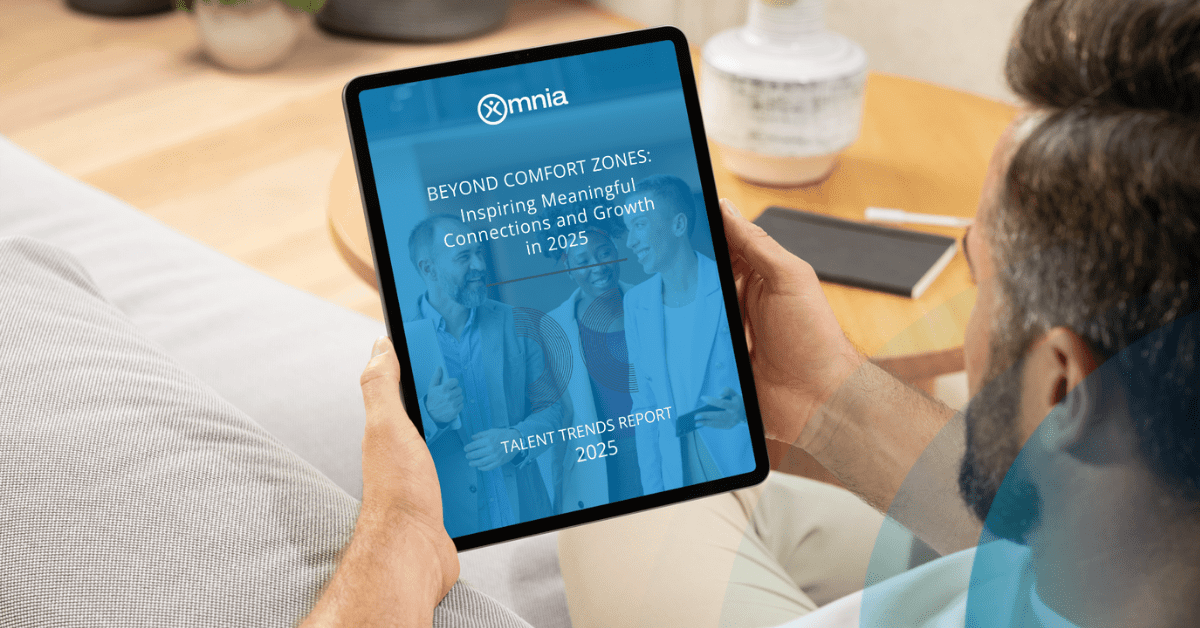In the realm of leadership, one size does not fit all. Teams are like ecosystems, composed of individuals with varying temperaments, communication styles, and work preferences. Effective leaders understand that adjusting their leadership style to complement the personalities of their team members can significantly enhance team performance, collaboration, and overall satisfaction. This approach both acknowledges the uniqueness of every person within the team as well as maximizes individual strengths and fosters a cohesive working environment.
A personality assessment, like The Omnia Behavioral Assessment, is a valuable first step in identifying and understanding the individual personalities on your team. Armed with those insights, leaders can proactively adjust their styles to leverage strengths and mitigate challenges.
4 ways to adapt your leadership style based on the personalities on your team:
The Go-getters
These are the ambitious, take-charge individuals who thrive on big ideas and growth opportunities. They often excel in imagining possibilities and taking the initiative to create and implement new plans. When leading this personality type, adopt an inspirational leadership style. This involves articulating a compelling vision, fostering creativity through brainstorming sessions, and encouraging out-of-the-box thinking. To successfully inspire this personality, offer challenging goals and provide the necessary support and resources to turn visions into reality.
Since Go-getters can sometimes set their sights quite high, remind them to submit their plans to a reality check to make sure they are achievable. Satisfy the Go-getter’s desire to take the lead by allowing them to manage projects or oversee committees. However, also make the limits of their authority within their job clear and define where they will need to work as part of the team.
The Collaborators
Collaborators are team players who work for the good of the group. They readily pitch in to help others and are most satisfied achieving win-win results that benefit everyone involved. Individuals who thrive on collaboration and consensus-building appreciate guidance and the chance to become proficient in their core duties before taking on new responsibilities within their roles. Collaborators can be cautious in the scope of their initiative because they do not want to do the wrong thing or overstep their boundaries, so leaders may need to set goals for them that stretch and grow their capabilities but do not feel overwhelming.
Successfully leading Collaborators involves cultivating a culture of trust and mutual respect where every team member feels heard and valued for their contributions. Because Collaborators may sometimes feel hesitant to speak up with their ideas or concerns, create platforms for open communication, where a variety of perspectives can be voiced and integrated into organizational strategies. Prioritize one-on-one interactions, regular feedback sessions, and personalized development plans. By actively listening to these team members’ aspirations and challenges, leaders can empower them to take ownership of their roles and responsibilities.
The Pragmatics
These employees value logical reasoning and data-driven decisions. They excel in roles that involve evaluating issues through an objective, fact-focused lens. Leaders who oversee Pragmatics should adopt a facilitative leadership approach. This involves providing clear frameworks, encouraging systematic problem-solving, and ensuring that decisions are based on comprehensive data and well-reasoned arguments. Pragmatics often thrive when given the chance to enhance their job knowledge and become subject matter experts within their roles.
Pragmatic often strive to be informative consultants to others but may sometimes come across in an overly technical way when explaining complicated concepts. Ensure they know how to lay out information in a way that people who are not as well versed can understand.
The Diplomats
Diplomats are socially outgoing and enjoy having opportunities to work with others. They can be adept at reading social cues and knowing how to engage and influence people through their compelling use of language. They prefer discussing ideas and solving problems collectively, so consider adopting a leadership approach that focuses on empathy and community-building. Offer opportunities for Diplomats to coordinate group activities or facilitate team discussions, allowing them to harness their skills in bringing people together. Assign them tasks that involve networking, relationship-building, or customer interaction, where their natural charisma and ability to connect with people can shine.
Because Diplomats can sometimes become sidetracked by opportunities to converse with others, ensure they have strategies for minimizing distractions when they need to focus on a task. Also, remind them of the value of performing due diligence and reviewing facts and evidence when making decisions in addition to heeding their social instincts.
No matter the varied personalities that make up your team, here are a few core practices that every leader can implement to foster successful, engaged teams:
1. Building Trust and Relationships
Effective leadership begins with building trust and meaningful relationships with team members. Leaders should invest time in getting to know their team members individually, understanding their motivations, strengths, and areas for development. By demonstrating genuine care and empathy, leaders can establish a foundation of trust that enhances collaboration and productivity.
2. Clear Communication
Communication is a cornerstone of effective leadership. Leaders should adapt their communication styles to resonate with different personality types. For example, some team members may want to know all the details about an issue, while others may prefer receiving a general overview. By tailoring their communication approach, leaders ensure that information is effectively conveyed and understood by all team members.
3. Empowering Through Delegation
Delegating responsibilities effectively is key to empowering team members and fostering a sense of ownership. Leaders should delegate tasks based on individual strengths and development goals, keeping in mind that some employees may want detailed direction initially while others will prefer having more autonomy to self-direct. Empowered team members are more likely to take initiative, innovate, and contribute positively to team outcomes.
4. Recognizing and Celebrating Achievements
Acknowledging and celebrating team achievements boosts morale and reinforces positive behaviors. Leaders should recognize individual and collective contributions publicly or privately, depending on the individual team member’s preference. Celebrating milestones, both big and small, reinforces a culture of appreciation and motivates team members to strive for excellence.
Adapting leadership styles to complement the personalities of team members is not merely a strategic approach but a fundamental aspect of effective leadership. By understanding and appreciating the diversity of personalities within their teams, leaders can tailor their approach to align with the unique strengths and preferences of each individual and, ultimately, inspire, empower, and guide their teams toward achieving collective success.
Want to know more about your unique leadership style? Need help understanding the variety of personalities on your team? Contact our experts today to see how our Leadership Style Report and Professional Development Report can put the power of personality insight to work for you!























